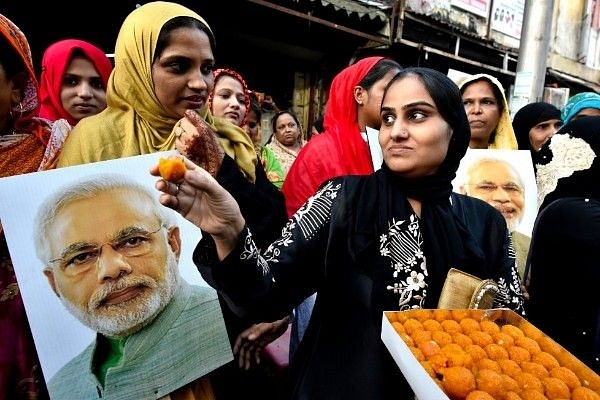Politics
Triple Talaq Win Exposes ‘Secularists’; Next Goals Should Be UCC And Abolition Of 35A, Article 370
- The Triple Talaq Bill is one more signpost on the road to genuine pluralism and junking of minoritarianism.
- Modi should keep at it.

Muslim women celebrating the ban on triple <i>talaq</i>. (Anshuman Poyrekar/Hindustan Times via GettyImages)
The passage of the triple talaq bill in the Rajya Sabha, which prescribes jail of upto three years for any Muslim man who uses this abhorrent way of divorce, is a loud comment on the hollowness of our secularism.
First, that such a law has been passed not by parties claiming the secular label, but one inflicted with the ‘communal’ tag, shows that secularism is simply a dog- whistle to encourage minority communalism. Even if we assume that the Narendra Modi government got the bill passed only to create a gender-based division within the Muslim community, it does not explain why parties that otherwise shout from the rooftops about secularism and gender justice failed to do anything about this personal law that could be used by men to subjugate their spouses.
Second, it is obvious that the law could not have been passed without important abstentions in the Rajya Sabha, where the government does not have a majority. The final 99-84 vote in favour of the bill was the result of the absence of Janata Dal(U), All India Anna Dravida Munnetra Kazhagam, Bahujan Samaj Party and Telangana Rashtra Samiti members in the house, even while significant numbers from the Congress, Nationalist Congress Party, YSR Congress, Telugu Desam and Rashtriya Janata Dal camps did the disappearing act. That parties which were committed to oppose the bill could not even get their members to turn up for the big day tells its own story on the hollowness of views on the subject.
This is nothing but hypocrisy and political cowardice. It would have been braver of the parties opposed to the bill to at least stand up for their beliefs than to scuttle away quietly, allowing their MPs to slither away quietly. In effect, the parties opposed to the bill had no convictions beyond the need to send a garbled signal to their Muslim vote banks.
One must compliment the Biju Janata Dal of Naveen Patnaik, which clearly chose to vote with the government, thus making its own stand clear and honest.
It goes to Narendra Modi’s credit that he has steadfastly championed this bill for nearly two years, even though his party did not have the numbers in the Rajya Sabha. That the numbers finally added up in his favour shows that if there is a will, there is usually a way at some point or the other.
It is possible to dismiss Modi’s commitment to criminalising triple talaq in one sitting as mere political messaging, but then one should doubt the motivations behind every contentious bill passed by any party. Modi’s or Bharatiya Janata Party’s political calculations are not material facts to consider when the end-result is the junking of an age-old practice that inflicted untold miseries on many Muslim women, many of them poor and lacking in resources.
One can also argue that the bill needlessly criminalises something that ought to have given a civil remedy, but the reality is that India has always sought to correct social injustices through harsh laws – whether it is dowry prevention, domestic violence or atrocities on SC/STs. In that sense, the Triple Talaq Bill – which, incidentally criminalises only talaq in one sitting, and not other forms of talaq – is not an outlier in Indian law-making.
Modi has got his way on this through sheer perseverance. The next halts on this journey are a uniform civil code (UCC), reintroduction of the Citizenship Amendment Bill to provide Hindu, Sikh, Buddhist, Jain and Christian victims of persecution in Pakistan and Bangladesh the right to citizenship earlier than some others, and abolition of section 35A and Article 370 of the Constitution that allow Jammu and Kashmir to remain an outlier in the Indian Republic. These goals will be called communal, but as the triple talaq victory shows, the only thing communal about them is the nature of the minoritarian dog-whistles that are not being called out.
The Triple Talaq Bill is one more signpost on the road to genuine pluralism and junking of minoritarianism. Modi should keep at it.
Support Swarajya's 50 Ground Reports Project & Sponsor A Story
Every general election Swarajya does a 50 ground reports project.
Aimed only at serious readers and those who appreciate the nuances of political undercurrents, the project provides a sense of India's electoral landscape. As you know, these reports are produced after considerable investment of travel, time and effort on the ground.
This time too we've kicked off the project in style and have covered over 30 constituencies already. If you're someone who appreciates such work and have enjoyed our coverage please consider sponsoring a ground report for just Rs 2999 to Rs 19,999 - it goes a long way in helping us produce more quality reportage.
You can also back this project by becoming a subscriber for as little as Rs 999 - so do click on this links and choose a plan that suits you and back us.
Click below to contribute.
Latest